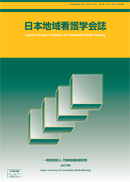Volume 22, Issue 1
Displaying 1-6 of 6 articles from this issue
- |<
- <
- 1
- >
- >|
Original Article
-
2019 Volume 22 Issue 1 Pages 4-12
Published: 2019
Released on J-STAGE: April 20, 2020
Download PDF (1013K)
Research Reports
-
2019 Volume 22 Issue 1 Pages 13-25
Published: 2019
Released on J-STAGE: April 20, 2020
Download PDF (1041K) -
2019 Volume 22 Issue 1 Pages 26-34
Published: 2019
Released on J-STAGE: April 20, 2020
Download PDF (1030K) -
2019 Volume 22 Issue 1 Pages 35-42
Published: 2019
Released on J-STAGE: April 20, 2020
Download PDF (992K)
Informations
-
2019 Volume 22 Issue 1 Pages 43-50
Published: 2019
Released on J-STAGE: April 20, 2020
Download PDF (988K) -
2019 Volume 22 Issue 1 Pages 51-58
Published: 2019
Released on J-STAGE: April 20, 2020
Download PDF (953K)
- |<
- <
- 1
- >
- >|
